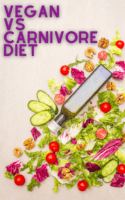The modern world is changing, especially when it comes to what we consume on a daily basis. People are opting for organic options or, even more so, for options that would personally improve their health.
Vegan diet
I’m sure you’ve heard of a vegan diet before; the diet where you only eat plant-based foods. So no dairy or meat – everything you consume comes out of the earth.
Veganism can be quite challenging in the beginning and requires a lot of dedication, not to mention that it can also be very expensive.
According to WebMD, “Studies show that vegans have better heart health and lower odds of having certain diseases. Those who skip meat have less of a chance of becoming obese or getting heart disease, high cholesterol, and high blood pressure.” A vegan diet also lowers the chances of contracting diabetes and some forms of cancer, like breast cancer in women.
Naturally, if you aren’t eating meat, you may not necessarily get the right amount of nutrients that are required for you to be healthy. Protein, calcium, omega-3 fatty acids, zinc and vitamin B12 and vitamin D all play a vital role in our body, and meat and animal products are good sources of these. For instance, calcium strengthens your bones and teeth. All these nutrients are fundamental in the healthy development of children and women who are pregnant.
According to WebMD, “One nutrient that’s impossible to get from plant sources alone is vitamin B12, which your body uses to make red blood cells and DNA. You’ll only find B12 in animal products. If you go vegan, you may need a supplement to make up for what you don’t get from your diet.”
Of course, remember that just because you’re following a vegan diet doesn’t mean that you can’t overdo it. If you eat too much high-fat and processed foods and have larger portions, you’ll certainly gain weight.
Elizabeth Belden on a Quora forum, shared: “My husband started eating a vegan, or plant-based, diet 25 years ago. His father’s side of the family is riddled with cancer, and his dad had just been diagnosed with it for the second time. His mother’s side all had heart problems. He decided that cutting animal products out completely would be the healthiest, easiest way to avoid both diseases. So far, it’s worked well. I joined him because I had no interest in cooking two different meals for dinner. I’ve eaten a vegan diet for about 14 years, after many years as a vegetarian. We’re both in our sixties, and are very healthy.”
Carnivore diet
On the opposite side of the diet spectrum is something called a carnivore diet. This diet comprises of meat, fish and eggs. No vegetables, legumes, or grains. Imagine eating only meat!
According to Healthline, “The Carnivore Diet stems from the controversial belief that human ancestral populations ate mostly meat and fish and that high-carb diets are to blame for today’s high rates of chronic disease.”
The benefit of the carnivore diet is that because you are only eating one type of food group, you are likely to lose more weight. However, there hasn’t been long-term evidence to suggest that this is the case.
Many people have shared their experience with the carnivore diet and have said that it has improved their overall health. Famous Clinical psychologist, Jordan Peterson shared his experience on the carnivore diet. According to Live Kindly, “The professor said he was battling a number of health issues himself, including depression, anxiety, reflux, psoriasis, sleep issues, and gingivitis. After reducing his diet to just meat and leafy greens earlier this year, he cut out the greens entirely a few months ago.”
While an all-meat diet sounds like something cool or exciting, there are pitfalls. Live Kindly emphasises, the “… World Health Organization, touts the important benefits of plant-based foods, particularly vegetables. They offer critical sources of vitamins and other micronutrients, as well as fibre, a macronutrient essential for heart and digestive health.”
Healthline highlighted four pitfalls of the carnivore diet:
- High in fat, cholesterol, and sodium
- May lack certain micronutrients and beneficial plant compounds
- Does not provide fibre, which helps with a regular bowel movement
- May not be suited for some people based on their health concerns
Besides all the health-related issues that may come with the carnivore diet, it is also very expensive and makes heavy demands on our environment.
An example of a carnivore diet for one day could include:
(This diet sample is provided by Healthline.)
Breakfast: trout, shredded chicken, bacon
Lunch: beef meatballs, small amount of Cheddar cheese, salmon jerky
Dinner: crab cooked in lard, filet mignon
Snacks: sardines, beef jerky
The takeaway
We are all different, and our bodies react differently to our food. If you ever to try the vegan or carnivore diet, perhaps consult a nutritionist or doctor to determine if it would provide the necessary nutrients for your overall health.
Tell us: Would you ever try the vegan or carnivore diet? Why or why not?
Read more here on food security.


